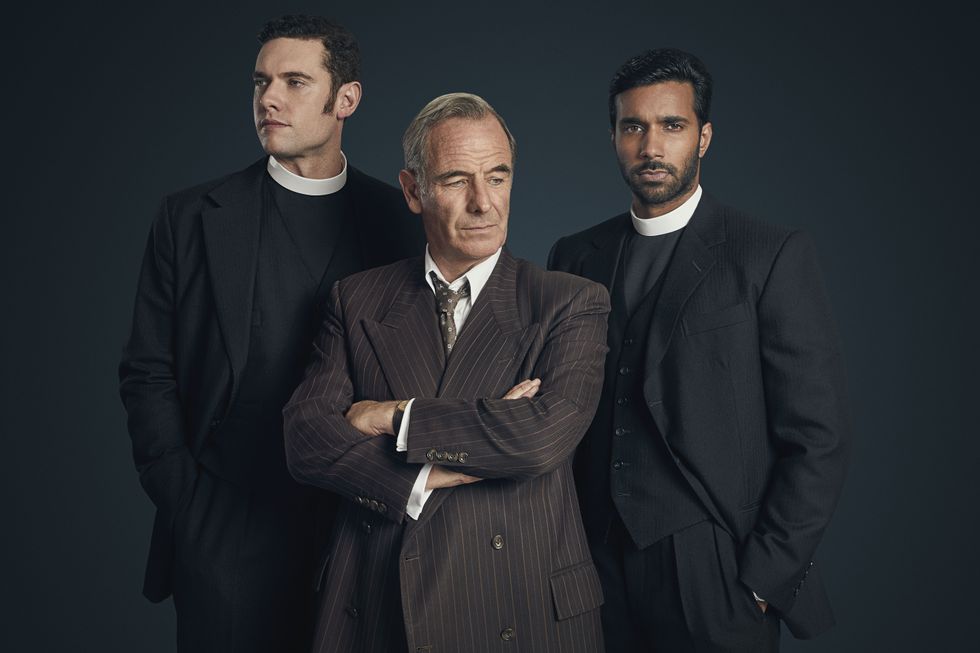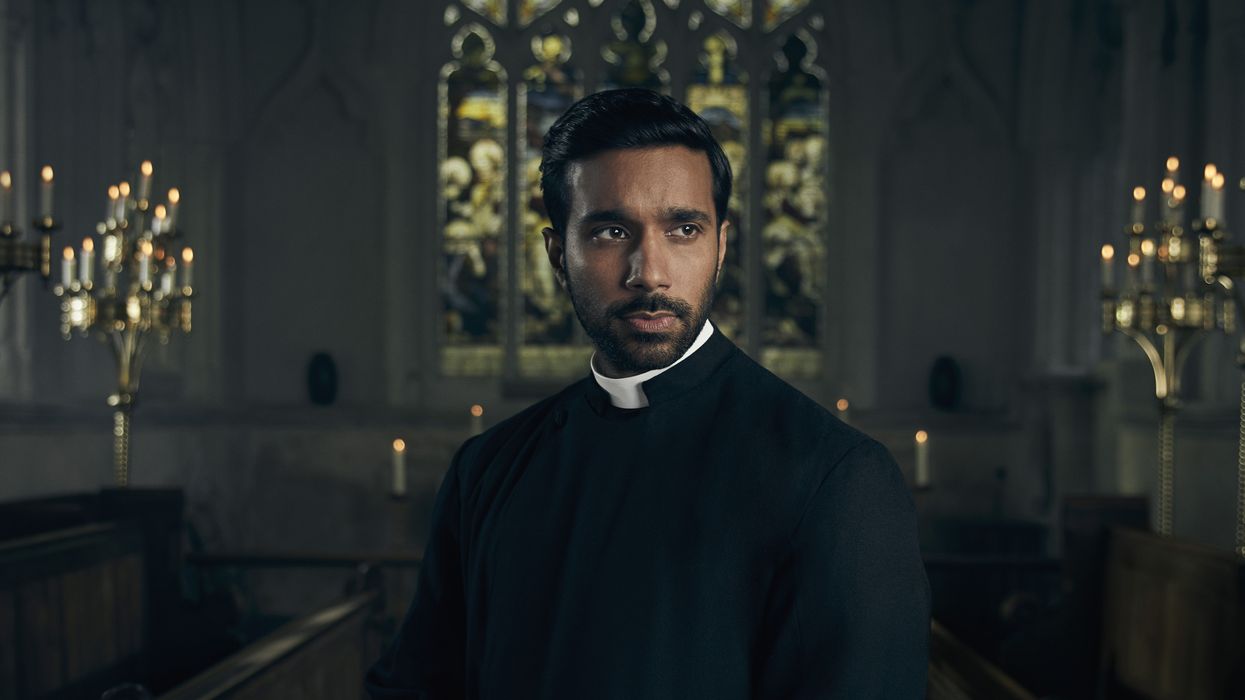RISHI SUNAK is now so famous as the first Indian occupant of 10, Downing Street, that when people refer to “Rishi”, it is automatically assumed that people are referring to the former prime minister.
But now, there is a new Rishi in town – and he has smashed the glass ceiling in just as spectacular a manner.
Actor Rishi Nair has been cast as the first Indian vicar, Alphy Kottaram, in the quintessentially English village of Grantchester in the Cambridgeshire countryside. Instead of a bike, he roars in at the wheel of a bright red Triumph Herald. And he likes hopping into bed with pretty women undergraduates.
The ITV drama, Grantchester, set in the 1950s, has been going since 2014 and has millions of fans all over the world. After a couple of Anglican English vicars – Sidney Chambers played by James Norton and William Davenport portrayed by Tom Brittney – Nair took over the role in the third episode of the ninth series. A 10th series is currently being filmed.
It is traditional for Cambridge undergraduates to punt to Grantchester for breakfast the morning after a May Ball. The novelist Lord Jeffrey Archer and his wife Dame Mary Archer bought the Old Vicarage, a 17th century property in the village associated with the poet Rupert Brooke, in 1979. He is the one who wrote the poem with the famous lines, “Stands the Church clock at ten to three?/ And is there honey still for tea?”
The Archers were the victims of a reallife crime last month when burglars broke into their garden at night while they were asleep and stole four precious bronze sculptures, worth tens of thousands of pounds. Archer does not think this crime will be solved.
The enduring appeal of the TV drama is that the basic plot does not change very much. There is a murder which the local copper in charge, Detective Inspector Geordie Keating (played by Robson Green), struggles to solve without the help of the vicar. Where he has a distinct advantage over the policeman is that people tend to confide in the man of god.
Alphy’s introduction to the village does not go smoothly. All conversation ceases and there is silence when he walks into the pub. In fact, when he walks into the vicarage, he is suspected of being a burglar. Keating rushes in to try and make an arrest and is thumped on the nose by a startled Alphy.
Green takes up the story: “In the first scene I had with Rishi, he punched me in the face. Geordie turns up to investigate an intruder in the vicarage and so his first impression of Alphy is he’s got a very good right hook. And then his second thought is, ‘Christ on a bike, you’ve stirred up a hornet’s nest by planting yourself in the middle of this quintessentially English village’ because he’s a ‘swarthy gentleman,’ as one of the characters says. Can you imagine?
“But because Geordie has become quite enlightened, he quickly warms to Alphy. He hears Alphy’s opinion of the police and Alphy gets Geordie’s steer on his opinion of god and they get past that.
“Then Geordie recognises that inquisitive outlook Alphy has on life, especially for crime, and they become solid friends. Very quickly they end up needing each other, and we get on with the cases.”

As an executive producer, Green was “very involved” in picking Nair for the role.
The 34yearold actor, who was born in Ealing in west London, portrayed lawyer Sami Maalik for four years in the Channel 4 soap Hollyoaks.
Green remembers Nair’s audition for Grantchester: “We knew it was going to be Rishi as soon as he walked in. The chemistry was there immediately. It’s a completely different new and wonderful energy with Rishi, and that’s the most delightful thing. He just fitted into the Grantchester family perfectly and he cares so much about the job.”
Green also talked of the drama’s appeal: “Rishi and I went to a press launch of Grantchester in Las Vegas last summer and were expecting about 100 people tops, but about 2,000 super fans turned up. It was like being at a Taylor Swift concert. They went bonkers.
“It really reinforced the love and joy and happiness I have for this show, because it just transcends so many barriers and has so many universal themes. And the fact that it’s loved around the world and in Las Vegas fills my heart with joy.”
Like Sunak, Nair has been brought up in a Hindu family.
He talked about the racism in 1950s England: “It was really important for me that we portrayed that storyline – of Alphy clearly looking very different to the other two vicars. Grantchester is still very white today, so you can imagine that back in the 1960s, it would not have been smooth sailing for him there. There’s a scene where he walks into the pub and everyone turns and looks at him, and that’s what would have happened.
“But I didn’t want his colour to become the overriding theme of the season. It’s great for the audience to see Alphy tackle racism headon – it’s something he’s experienced his whole life and he’s gone to Grantchester to try to change people’s minds. He loves that challenge of, ‘Don’t judge me by the way I look. Judge me by my actions.’”
Nair did a fair bit of research before the audition: “I went to different Church of England churches in London and in Liverpool, where I live, and sat at the back and watched the vicars do their sermons to get some inspiration. It was really interesting – some vicars are quite performative; some are quite conversational. And to spend time in those stunning churches was so nice.
“And then to tap into the early 1960s, I listened to music from that era on Spotify to get in that mindset. I really liked Dusty Springfield and I listened to lot of Elvis and Etta James. I found myself really falling in love with 1960s soul music. It’s become a really big part of my music library now.”
On his first day on set, he felt “like the new kid at school, especially since I didn’t join until episode three. When I first saw the vicarage set, I felt like I had been transported back in time.”
Nair described what he has in common with the character of Alphy: “I’m not as religious as Alphy, but what I have in common with him are his principles and morals that he takes from his religion.
“And Alphy is described as really having a problem with people exploiting their power over others. I’ve always been a bit like that as well. Away from religion, Alphy is massively into sport, which I also love, so that was easy to relate to.”
Alphy, added Nair, is “a glass halffull kind of guy, happygolucky, very positive, a bit suave. He wants to help people, but there is also this stern side to him that [Grantchester screenwriter] Daisy [Coulam] describes beautifully as ‘an iron fist in a velvet glove’. If he sees something he doesn’t agree with morally, he will always stand up to it. He can’t let it pass. There’s a lot there to play with.
“Alphy is happy being single and he’s not looking for anyone… he meets women and has fun with them and doesn’t take anything too seriously.”




